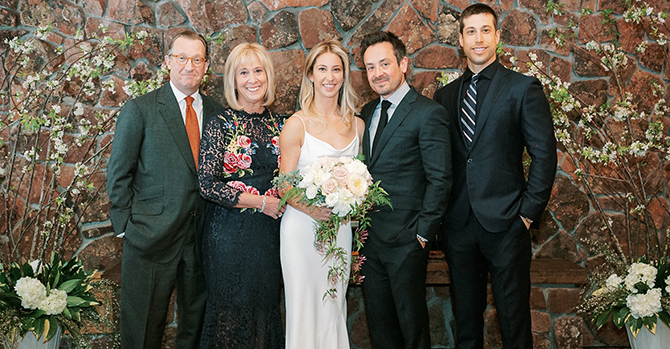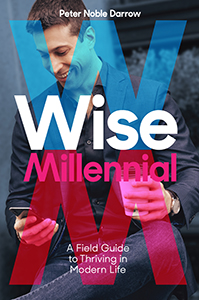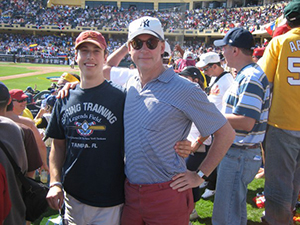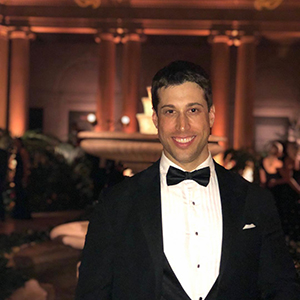MY NEW YORK STORY
 Sister Meredith’s wedding in Aspen
Sister Meredith’s wedding in AspenBy Peter Darrow
Iwas born at the (now defunct) New York Hospital in Manhattan. My father was a young partner at a law firm and my mother worked in investment banking for Salomon Brothers, then First Boston. I only recently found out that instead of taking me directly home to our apartment on 114th Street & Riverside, as is customary when being discharged with a newborn, my parents decided to travel three hours in a car straight to our second home in Sag Harbor. It was a Thursday, after all, and understandably you can’t miss a summer Hamptons weekend!
We moved to Madison Avenue and 95th soon thereafter, where I spent the next 25 years of my life. My sister, Meredith, attended The Spence School, and I attended The Browning School. We had an incredible live-in nanny named Hyacinth “Ermie” Springer, a native of Barbados, who worked with us for all those years and is like a pseudo-grandmother to me (she is still alive and healthy at 87, and I go visit her frequently in Barbados). As many New York families tend to do, both my sister and I attended boarding school; my sister went to The Lawrenceville School, in Princeton, NJ, and I enrolled at St. Paul’s School in Concord, NH.
A COST TO MY PSYCHOLOGICAL HEALTH
This all sounds lovely, but here’s the truth….

I witnessed a hyper-competitive, very affluent environment (to no fault or choice of my own) in which many parents would obsess over wanting their children to be experts in everything, be fearful of the first sign of any difficulty in any subject and try to use money to keep their kids in line. I witnessed friends of mine go to rehab at age 16 for drugs and alcohol, because their parents weren’t involved in rearing them and were too busy building their own careers. You grow up too fast in New York City.
I was lucky my parents were very involved in my upbringing. To their credit, they were incredibly smart and Ivy-league educated; my father attended Columbia College, and my mother was an early female graduate from Harvard Business School. They understandably had the same high expectations set for my sister and me. My father especially was very hard on us…there was a specific “life formula” laid out for us; success was defined by attending certain schools, and working specific kinds of jobs, and belonging to country clubs, etc. If you didn’t follow this formula, then you wouldn’t be “successful.” Let me be very clear: this wasn’t done with any malicious intent. It was coming from a loving place, based on what had worked for them. It just wasn’t necessarily what was in the best interest for my sister and me. They simply wanted to provide a comfortable home for their kids, and they achieved that.
What’s the lesson here?
You can’t choose the family you’re born into, nor should you shy away from any advantages which it may provide. But you can choose how you conduct yourself and how you treat others. You can choose your motivations, and how to use that knowledge and power for greater good. We all strive to “leave our kids with more than what we had” Isn’t that the goal, after all? But if not handled with care, these good intentions can lead to a lot of guilt, identity confusion, feelings of low self-esteem or self-worth, and power politics. What can be done differently to avoid this? Allow kids to fail. For me as a non-parent, the role of parenting, it seems is not to put up protective barriers around children (for example, the recent college admissions scandal), but rather to be a safety net. In fact, you should encourage failure. That’s the only way a child learns. But understandably, that’s a hard pill for any parent to swallow.
 Peter and his late father at the World Baseball Classic, Disneyworld
Peter and his late father at the World Baseball Classic, DisneyworldTHE TRANSFORMATION BEGINS
My father passed away suddenly in 2013 after battling myeloma cancer. He was 62 years old and otherwise very healthy. I was halfway through my MBA in entrepreneurship at Babson College in Wellesley, MA, and my sister was already running a successful contemporary arts business in Los Angeles. His death had a profound and deeply emotional impact on my life. I was already extremely passionate about health and wellness, and decided shortly thereafter to open a farm-to-table restaurant in Union Square called Darrow’s Farm Fresh in his honor.
While in operation, we received favorable press and partnered with a lot of high profile companies, such as Nike, Equinox, Lululemon, SoulCycle, etc. While I was incredibly proud of what I built and accomplished, it was simply too large of an operation for me to handle and we weren’t making money. I was also trying to salvage a struggling relationship with my serious girlfriend, and decided to close the restaurant after one year. When she left me two weeks later, my whole world felt like it had crumpled and I had lost everything. In that moment, I took a hard look in the mirror and thought to myself, “Whose life am I really living?” It didn’t feel like mine. It felt like someone else’s….perhaps my father’s?
Over the course of the next two years and with the help of lots of meditation, therapy, and introspection, I re-examined every lesson I had ever been taught and underwent a personal transformation. I asked “Why?” to every “rule” that had been put in my head. It was an incredibly difficult journey, but I felt liberated.
 The Young Fellow’s Winter Ball at The Frick Collection
The Young Fellow’s Winter Ball at The Frick CollectionThat’s when I decided to write a book. Wise Millennial: A Field Guide to Thriving in Modern Life (available on Amazon.com and at Barnes & Noble) which is a self-help book/memoir which uses my own stories to illustrate the lessons I’ve learned. My goal is hopefully to empower other millennials in finding their true inner happiness, and lead a more authentic, meaningful life. I hope others will be inspired to start making changes in their own life, break free from limiting beliefs and outdated values on a never-ending journey for the inherent human right to love and happiness.
I would characterize My New York Story as a successful one; I was able to navigate the extreme pressures of affluence, peer pressure, and social hierarchy over many years without turning to drugs, alcohol, or other forms of self-abuse. I have been able to stay relatively level-headed and positive, maintain close friendships, and I am now focused on turning that energy outward to help others.




